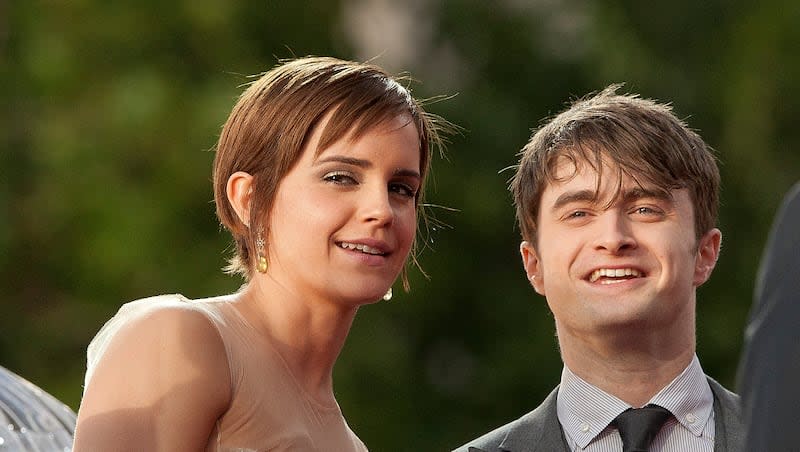J.K. Rowling claims she cannot forgive ‘Harry Potter’ actors Daniel Radcliffe, Emma Watson

- Oops!Something went wrong.Please try again later.
- Oops!Something went wrong.Please try again later.
- Oops!Something went wrong.Please try again later.
- Oops!Something went wrong.Please try again later.
J.K. Rowling sparked a new wave of backlash over her views on transgender rights by tweeting extensively Wednesday about a new report on transitioning children.
As part of the series of posts, the famous author said that “Harry Potter” actors Daniel Radcliffe and Emma Watson, as well as other celebrities who “used their platforms to cheer on the transitioning of minors,” can “save their apologies” to her for speaking out against her past comments on gender identity issues.
For years now, Rowling has candidly shared her opinions regarding transgender issues. Amid the author’s ongoing commentary, Watson and Radcliffe have expressed support for transgender people.
“Trans people are who they say they are and deserve to live their lives without being constantly questioned or told they aren’t who they say they are,” Watson tweeted in 2020.
In 2020, Radcliffe published a letter about the issue on The Trevor Project’s website — an LGBTQ nonprofit organization.
“To all the people who now feel that their experience of the (’Harry Potter’) books has been tarnished or diminished, I am deeply sorry for the pain these comments have caused you. I really hope that you don’t entirely lose what was valuable in these stories to you,” Radcliffe wrote.
Several ‘Harry Potter’ stars have publicly offered support for Rowling
Ralph Fiennes
Voldemort actor Ralph Fiennes has defended Rowling more than once.
In a 2022 interview with The New York Times, Fiennes said, “The verbal abuse directed at (Rowling) is disgusting, it’s appalling.”
And in a 2021 interview with The Telegraph, Fiennes said he “can’t understand the vitriol directed at her.”
“I can understand the heat of an argument, but I find this age of accusation and the need to condemn irrational. I find the level of hatred that people express about views that differ from theirs, and the violence of language towards others, disturbing,” he said.
Jim Broadbent
Jim Broadbent, the actor who portrayed Professor Horace Slughorn, has also commented on the heavy backlash Rowling has faced.
“It’s really sad. I think J.K. Rowling is amazing. I haven’t had to confront it myself, but I would support her in that, I think, if it came to it,” Broadbent told The Telegraph in 2023.
Helena Bonham Carter
Helena Bonham Carter, who stars in the “Harry Potter” series as Bellatrix Lestrange, has criticized the backlash against Rowling in the past.
“I think she’s been hounded,” the actor told the London newspaper The Times. “It’s been taken to the extreme, the judgmentalism of people. She’s allowed her opinion, particularly if she’s suffered abuse. Everybody carries their own history of trauma and forms their opinions from that trauma and you have to respect where people come from and their pain.”
Bonham-Carter also spoke on her distaste for cancel culture in the interview.
“You can’t ban people. I hate cancel culture. It has become quite hysterical and there’s kind of a witch hunt and a lack of understanding,” she said.
Evanna Lynch
Evanna Lynch, known for her role as Luna Lovegood in “Harry Potter,” sees Rowling as an advocate for “the most vulnerable members of society,” per The Telegraph.
“I do have compassion for both sides of the argument. I know what it was like to be a teenager who hated my body so much I wanted to crawl out of my skin, so I have great compassion for trans people and I don’t want to add to their pain,” Lynch told The Telegraph.
“I do also think it’s important that J.K. Rowling has been amplifying the voices of detransitioners. I had this impulse to go, ‘Let’s all just stop talking about it,’ and I think probably I’m a bit braver now about having uncomfortable conversations,” she said.
She continued, “I just felt that her character has always been to advocate for the most vulnerable members of society. The problem is that there’s a disagreement over who’s the most vulnerable. I do wish people would just give her more grace and listen to her.”

